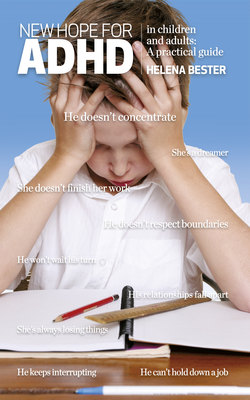Читать книгу New hope for ADHD in children and adults - Helena Bester - Страница 10
На сайте Литреса книга снята с продажи.
Questions that could shed light
ОглавлениеWas the birth normal?
There is no clearly observable pattern here. Some ADHD children were born naturally while others were delivered by Caesarean section, without complications. Where there have been forceps deliveries and other complications I ask for more details and examine available clinical reports.
Were there any complications or traumas from shortly after birth until the child was two years of age?
There was often an incident of a very high fever.
Was your child a calm or restless baby?
Many ADHD children were difficult babies who seldom slept through the night.
Did your child reach the developmental milestones within the normal time frame?
“Yes. She actually started walking early. Though she did start talking a little late. Her speech has always been a bit unclear. You still can’t always get what she’s saying if you don’t know her.”
Was your child very demanding from a young age (about three or four) or did she sometimes play alone?
Surprisingly many parents say that their children were able to play alone for hours on end at preschool age. (According to the literature, the symptoms usually start presenting at this age.) Some children, on the other hand, were very active and demanding from the time they started walking.
When did you receive the first negative feedback from school?
The “problems” usually begin in Grade R. The urgency of the teacher’s concern usually increases during the second half of the year. (If negative feedback only starts in Grade 2 or later, a learning problem may be the core issue.)
What was the main focus of the complaints?
“He doesn’t concentrate when we do mat work.”
“She doesn’t complete her work.”
“He disturbs his friends.”
“He won’t stop talking in class.”
“He doesn’t wait his turn.”
“His drawing/handwriting is untidy.”
“She keeps losing things.”
“He forgets to bring messages home or to write down his homework.”
“He has difficulty with reading.”
(The responses vary markedly depending on the child’s age. I will discuss the behaviour that is typically associated with ADHD at greater length later. The above are merely a few examples of very common complaints.)
Do you have difficulties with discipline?
In more structured households there are fewer discipline problems. A general complaint is that it often seems as if the child does not hear what is being said. Behaviour that is regarded as being naughty or disobedient is common.
If you give your child two or three tasks to perform, can she remember them and carry them out?
“Oh, no. On the way to do the first she becomes distracted – and when I look for her ten minutes later she’s playing with the dog.”
Does he get up on time in the mornings and is he ready for school on time?
“Every morning is a battle. He’d take hours just to put his socks on if I didn’t hurry him along or threaten him. And it’s the same with brushing his teeth, eating breakfast and absolutely everything he has to do. We’re late every morning.”
Does she do her homework regularly and properly?
“Homework is the worst time of day in our home. It takes an eternity to get going and then ends in tears. And everything is always lost or in a mess.”
What are test results generally like?
“Abysmal. Sometimes I am absolutely sure that he knows his work. But when the marks come back it’s a disaster.”
“Sometimes the marks are excellent and sometimes they’re very bad.”
Can she sit and do her homework alone?
“Not at all. As soon as I turn my back she’s gone. Sometimes if I threaten blue murder she’ll remain seated at the table. But when I return half an hour later she’s done nothing.”
What has your intuitive sense of your child’s intellectual ability been from infancy?
“That’s just what I can’t understand. Everyone’s always remarked how quick and bright she is. It was such a shock when we saw her first school report.”
Does your child talk a lot?
“Sometimes without stopping. He also says the most inappropriate things sometimes. We’ll be chatting about current events and he’ll interrupt someone with a statement about something that happened during rugby practice.”
Remember that the above answers are typical responses – based on interviews with parents of children with ADHD with hyperactivity. If your responses to some of the questions are different, it does not mean that your child is not an ADHD sufferer. Not all the questions are based on the symptoms according to which ADHD is formally diagnosed, but we will get to the more technical aspects later.
